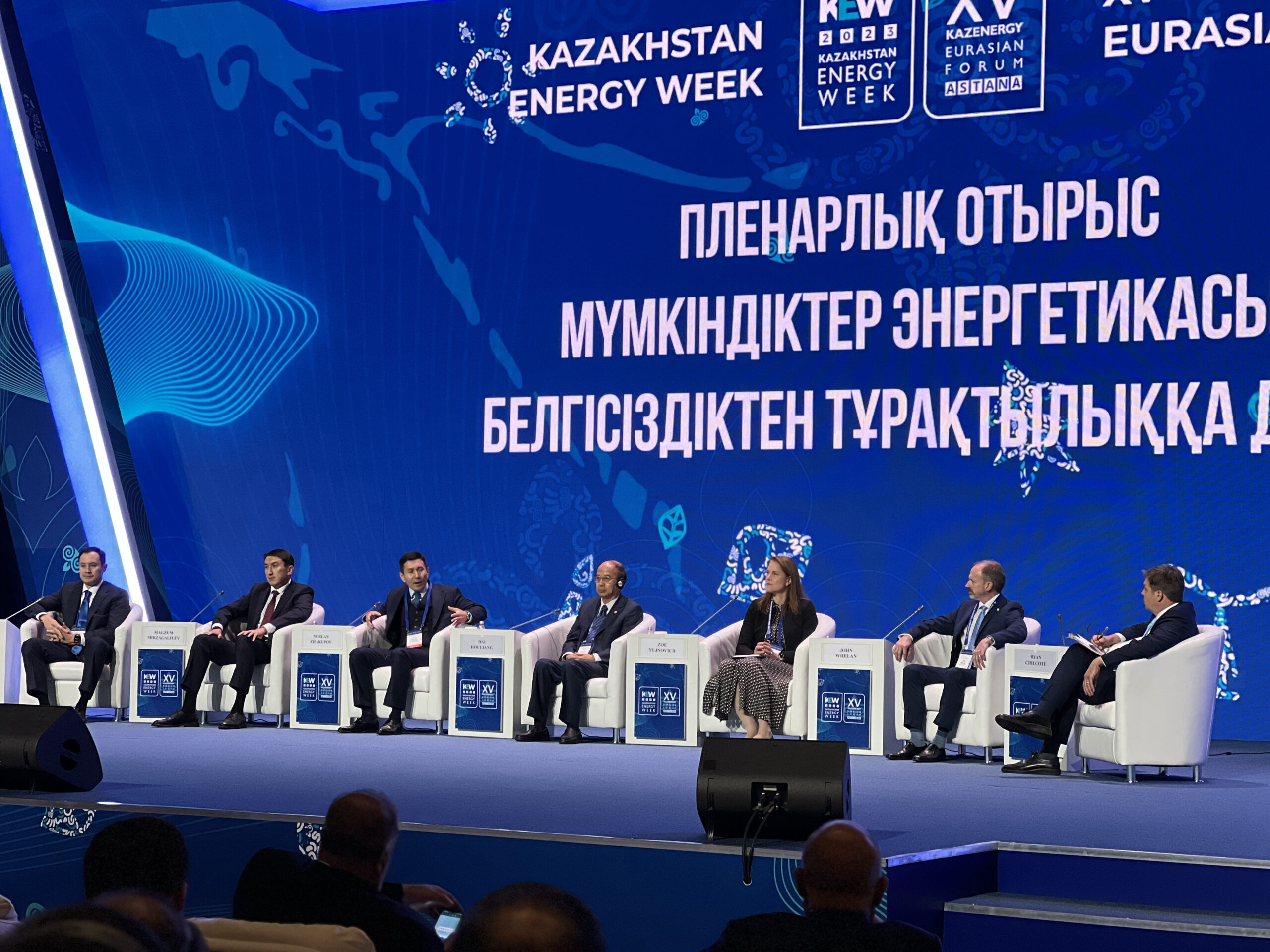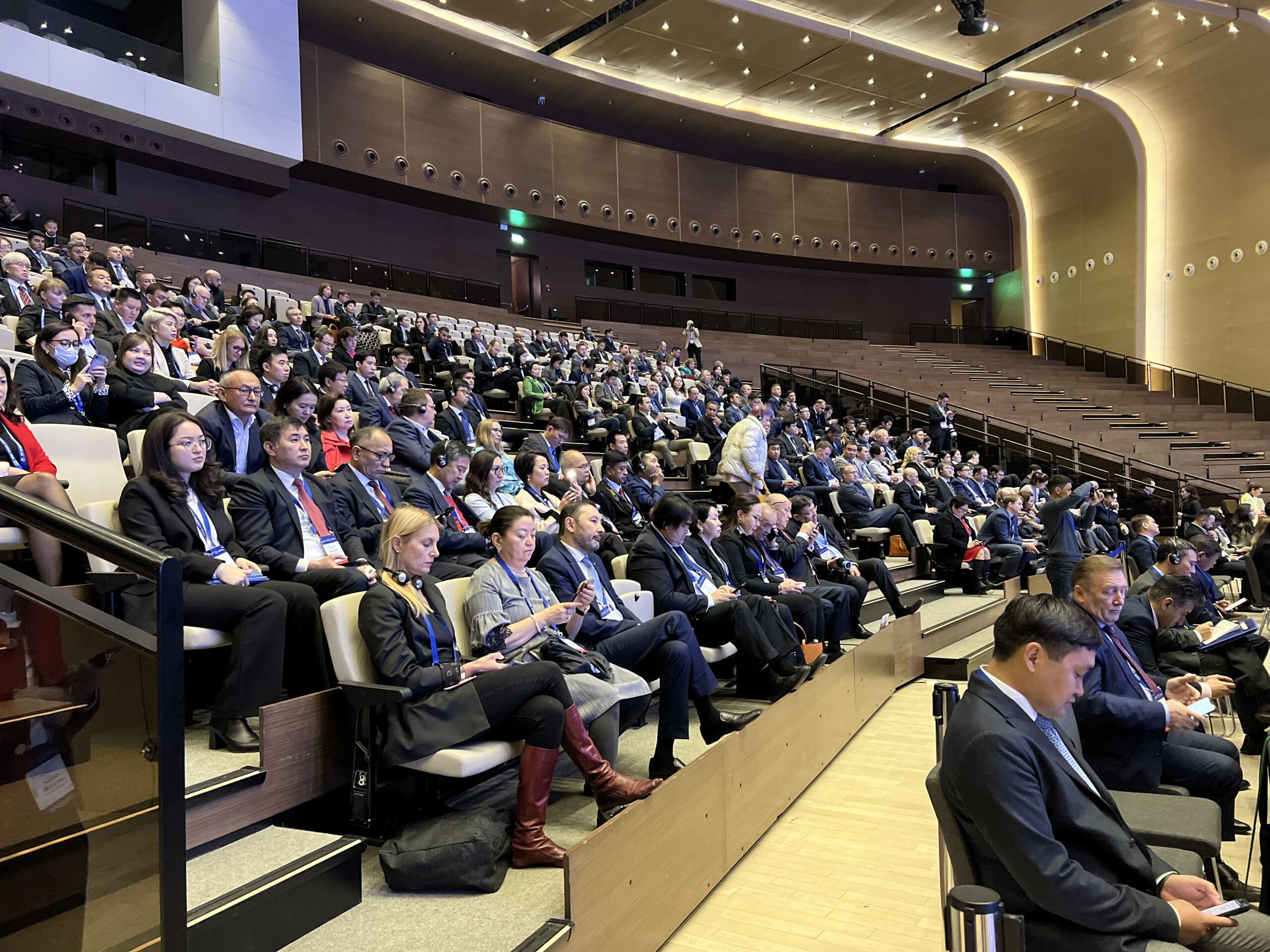ASTANA – Kazakhstan’s journey toward energy transition can serve as a good example for other oil-producing countries, said keynote speakers at a plenary session of the KazEnergy Eurasian Forum on Oct. 4 in Astana.

From L to R: QazaqGas Chairman Sanzhar Zharkeshov, KazMunayGas Chairman Magzum Mirzagaliyev, Samruk Kazyna CEO Nurlan Zhakupov, CNPC Chairman Dai Houliang, Shell’s Upstream Director Zoë Yujnovich and Senior Vice President at ExxonMobil Upstream John Whelan and Moderator Ryan Chilcote. Photo credit: Aida Dosbergenova/The Astana Times.
The forum, which kicked off on Oct. 3 and will last through Oct. 6, is aimed at promoting dialogue between the energy market participants and exploring current trends and areas for energy system development.
Opening the plenary session, Kazakh Minister of Energy Almasadam Satkaliyev said the country plays an integral role in international and regional energy cooperation. Kazakhstan, he noted, is aware of the importance of balancing the economic, social and environmental aspects of energy development.
Satkaliyev read out the address from President Kassym-Jomart Tokayev, where the Kazakh leader noted the impact of geopolitical challenges on the global energy sector, which elevated the importance of ensuring energy security, sustainable energy supply chains and the development of green technologies.
“Kazakhstan has established itself as a reliable supplier of energy resources to the world markets while also actively developing export routes and the necessary transport and logistics infrastructure,” said Tokayev in his address to the forum.

The annual forum gathered government officials, energy experts and policymakers. Photo credit: Aida Dosbergenova/The Astana Times.
He emphasized Kazakhstan is committed to consistent economic diversification while also facing the challenge of creating clusters with high-added value through the implementation of various projects.
Tokayev reiterated the efforts undertaken by the government to create favorable conditions for investors. He also reminded of Kazakhstan’s commitment to achieve carbon neutrality by 2060.
Director General of the International Renewable Energy Agency (IRENA) Francesco La Camera said Kazakhstan is well positioned to ensure a smooth energy transition.
“Kazakhstan is well positioned with vast solar and wind resources. The country has already taken commendable steps toward diversifying its energy mix, installing approximately two gigawatt of new renewable power capacity over the past three years,” said La Camera.
Among these steps are the adoption of a carbon neutrality strategy in February and a commitment to developing alternative energy sources, to name a few. As of 2022, renewables account for nearly 5% of the country’s energy balance and the figure is expected to reach 15% by 2030.
La Camera stressed Kazakhstan’s journey towards sustainable energy transition has both local and global imperative. “The country’s strategic position can set the precedent for how oil-producing countries navigate this transition,” he added.
In countries’ effort to chart a sustainable course for future generations, La Camera touted the importance of three fundamental pillars – infrastructure, policy and skilled workforce.
According to IRENA’s World Energy Transitions Outlook, the world needs to triple global renewable power capacity to more than 11,000 gigawatts by 2030 to maintain the possibility of limiting global warming to 1.5°C.
World Energy Council CEO Angela Wilkinson said the world is facing a “decisive decade for climate and energy security.” “The race to zero has created an increasingly crowded and competitive, divisive and polarized energy leadership landscape,” she said.
Wilkinson acknowledged there is no such thing as a quick, easy or cheap energy transition, saying energy transition is the process, not the destination.
“It has become fashionable to talk about all good versus bad energy. This approach may work well in fairy tales, but it does not help build better energy systems for all,” she said.
She noted the connections between energy security, affordability, equity and environmental sustainability should be managed together throughout the energy transition process.
The question facing all leaders is how to accelerate decarbonization with justice and resilience. “To succeed, we must pull all available levers. We must stretch collaborations across science, sectors and systems in an increasingly divisive and polarized era, and we must change the leadership framework from fear of the future, and fear of missing out to maintaining a sense of realistic hope. Hope is always in action,” she said.
Wilkinson also said the complexity of Kazakhstan’s journey can “serve as an inspirational story for others.”

